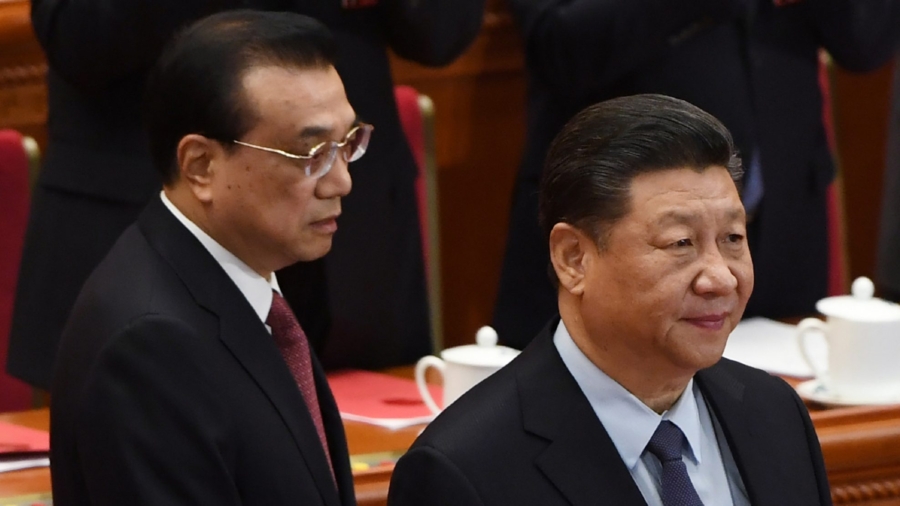During a recent inspection tour of villages in the region of Ningxia, Chinese leader Xi Jinping emphasized his goal for China to become “a moderately prosperous society.” This catchphrase was coined soon after he took power in 2012, and is his flagship economic policy.
Xi also penned a May 31 article in Qiushi, the Chinese Communist Party (CCP)’s official magazine, that China is advancing toward achieving that goal, with “400 million people in the middle class.”
His standard for middle class was: an annual household income of 100,000 to 500,000 yuan ($14,160-$70,810). But in China, multi-generational households living under one roof are not uncommon.
Meanwhile, Chinese premier Li Keqiang has recently highlighted the unemployment and poverty crisis in the country, which have been exacerbated by the CCP virus pandemic.
Li said during a meeting of China’s rubber-stamp legislature on May 28 that 600 million Chinese only earn 1,000 yuan ($140) per month, which is not enough to pay for monthly rent on a one-bedroom apartment in a mid-sized Chinese city.
Li then promoted the idea of setting up a “street vendor economy” to alleviate the rising unemployment as a result of the pandemic.
On June 1, Li again said at an economic seminar in Qingdao city: “The challenges that [China] is facing is unprecedentedly difficult.” Li emphasized that hundreds of millions of Chinese people need financial support.
After Li’s speeches, state-run media first promoted the street vendor economy, but began running articles criticizing the idea on June 5.
Since then, each provincial and city government delivered conflicting information on whether or not street vendors would be allowed to sell their wares.
Observers have interpreted the openly contradictory messaging of late as an indication of the power struggle between Xi’s political faction and Li’s.
“Xi and Li fighting with each other in public certainly made it difficult for lower-ranking officials to position themselves,” said U.S.-based China affairs commentator Tang Jingyuan.
Infighting Goes Public
Frank Tian Xie, business professor at the University of South Carolina Aiken, also read Li’s comments as a direct rebuke of Xi. “It shows that Chinese Communist Party senior officials hold different opinions and struggle with each other,” Xie said in an interview.
U.S.-based commentator Jiang Feng said on his YouTube show that Li’s comment about 600 million people living on a monthly income of less than 1,000 yuan was “a slap in the face of Xi Jinping. Xi said China would realize a moderately prosperous society in 2020.”
Tang analyzed that because Li is the Party’s top official on economic policy, he would take the blame for the country’s economic woes.
As China’s economy continues to go downhill, Tang said Li had no choice but to admit to Chinese citizens that the situation was serious.
“Obviously, Li doesn’t want to take the responsibility of lying to the public. This is the key reason why Li announced the existence of such a large number of poor people in China,” Tang said.
Chinese Economy
He Junjiao, a Chinese economist based in Hunan Province, told the Chinese-language Epoch Times that Chinese economy is in a critical situation, and even the street vendor economy can’t save it.
“If a country relies on the ‘street vendor economy’ to support people’s livelihood, the country is on the edge of bankruptcy… Behind Li’s street vendor economy is mass unemployment,” He said.
The Chinese regime, in desperation, is calling on people to become small-time entrepreneurs. “Otherwise they will starve, or even riot if they have nothing to eat,” He said.
Beijing Normal University conducted a recent survey that shed more light on Chinese people’s average incomes.
Shanghai-based Chinese magazine Caixin reported on June 3 that the university made estimates after surveying 70,000 people.
“The monthly income of 547 million Chinese people, which is 39.1 percent of the population, is less than 1,000 yuan. 52.5 million Chinese people’s monthly income is between 1,000 to 1,090 yuan ($154). That means 42.85 percent of Chinese population earned less than 1,090 yuan every month,” according to the report.
Among those people, 5.46 million Chinese have no income; 216 million Chinese earn less than 500 yuan ($70) every month; and another 200 million Chinese’s monthly income is lower than 800 yuan ($113).
The chairman of China Fuyao Glass, a multinational auto glass manufacturer, once told Chinese media that China has less than 300 million people who have the luxury to buy non-essential products.
According to the latest data released by China’s National Statistics Bureau, the median disposable income was 26,523 yuan ($3,753) for the year 2019. Chinese media noted that this amount of money could only support basic living costs in China.
From The Epoch Times


